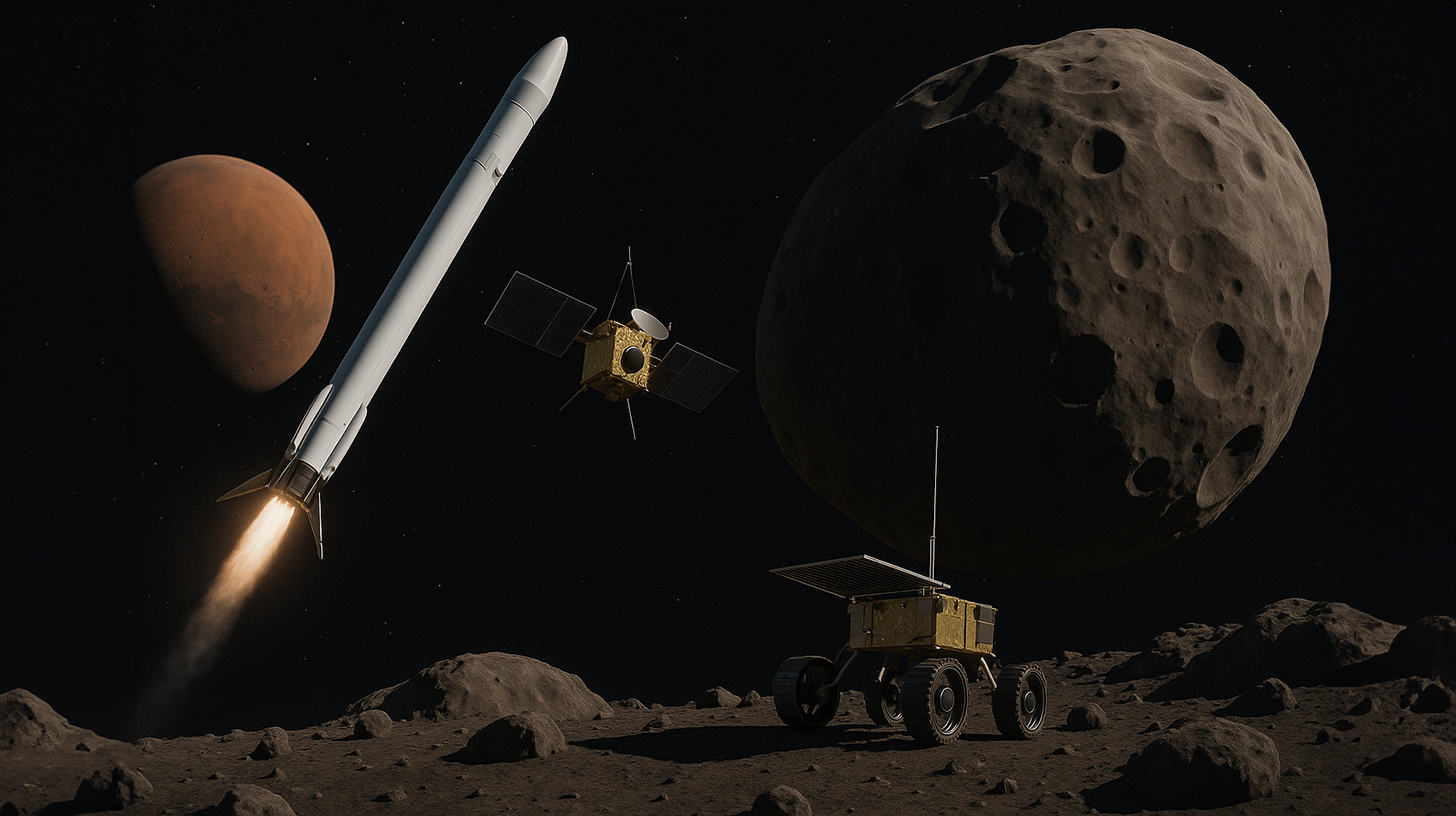
Rovers to the Martian moon & rockets like SpaceX: This is what Germany is now planning with Japan – Image: Xpert.Digital
A new dimension in space travel: Germany relies on a strategic partnership with Japan
Germany's bold plan in space: How Japan is supposed to help us rise to a space power
The German-Japanese space partnership has been significantly strengthened following the reaffirmation by Space Minister Dorothee Bär and Federal President Frank-Walter Steinmeier of their ambitions for expanded cooperation at Expo 2025 in Osaka. This strategic alliance marks an important milestone in Germany's efforts to expand its international leadership role in space exploration.
Suitable for:
- With innovation and ambition into orbit – Rocket Factory Augsburg and Isar Aerospace are challenging the future space industry
Political dimension of the partnership
High-level diplomatic framework
Federal President Steinmeier's visit to Japan from June 17 to 20, 2025, underscores the political importance of bilateral relations. The three-day trip, which culminated in the opening of German National Day at Expo 2025 Osaka, was deliberately used as a platform for deepening cooperation in the space sector.
Prime Minister Shigeru Ishiba hosted Steinmeier for an extensive working lunch, praising the close ties between the two countries in the areas of business, science, and government. This high-level political support lays the necessary foundation for the planned extension of the space partnership.
Strategic goals and ambitions
German Space Minister Dorothee Bär clearly stated the German position: “We want to become more effective, expand our leading role, in Europe and internationally, with our outstanding partners like Japan.” This statement reflects Germany’s ambition to play a key role in space exploration not only at the European level, but also in a global context.
Specific cooperation projects and successes
Proven cooperation between DLR and JAXA
The partnership between the German Aerospace Center (DLR) and the Japanese space agency JAXA forms the operational backbone of bilateral space cooperation. Currently, DLR maintains around 300 cooperation contacts with approximately 50 active projects, illustrating the broad scope of the collaboration.
The areas of cooperation include in particular:
- Space robotics
- Earth observation and planetary research
- Atmospheric research
- Aircraft design
- Space transportation and reusable systems
Successful missions as a foundation
Hayabusa2 and MASCOT
A prime example of successful German-Japanese cooperation is the Hayabusa2 asteroid mission. The MASCOT (Mobile Asteroid surface SCOuT) lander, developed by the German Aerospace Center (DLR) and the French space agency CNES, was successfully deployed on the asteroid Ryugu and delivered important scientific findings.
MASCOT, a compact lander measuring 29.5 x 27.5 x 19.5 cm and weighing 9.8 kg, was equipped with four scientific instruments to investigate the geology, mineralogy, and thermal properties of the asteroid. The mission impressively demonstrated the technological expertise and successful project management of both partners.
EarthCARE climate satellite
The ESA mission EarthCARE, launched in May 2024, represents another significant cooperation project between Germany and Japan. The climate satellite, developed by ESA in collaboration with the Japanese space agency JAXA, is expected to provide revolutionary data for weather and climate research.
With its highly advanced instruments, EarthCARE measures the density and water content of clouds and investigates the influence of clouds, solar radiation, and aerosols on the Earth's atmosphere. For the first time, the mission enables the creation of a 3D model of the atmosphere across its entire altitude profile.
Suitable for:
- German Startup Space Race: Germany reaches for the stars with Rocket Factory Augsburg and Isar Aerospace from Munich
Future projects and innovations
MMX – Exploration of the Martian Moons
The planned MMX (Martian Moons Exploration) mission represents the next major project of the German-Japanese space partnership. Germany plays a central role through the IDEFIX rover, developed jointly with France, which will explore the surface of the Martian moon Phobos.
The MMX mission, scheduled for launch in 2026, will study both Martian moons Phobos and Deimos in detail and collect material samples from Phobos for the first time. Eight DLR institutes from five locations are contributing to this ambitious project, with the Institute of Robotics and Mechatronics assuming overall project management.
DESTINY+ Asteroid Mission
The German-Japanese mission DESTINY+, launched in 2024, is exploring interplanetary dust particles and the asteroid 3200 Phaethon. The mission's key instrument is the German dust telescope DDA (DESTINY Dust Analyzer), which collects and analyzes cosmic dust samples throughout the flight.
Callisto – Reusable Rocket Technology
The Callisto project represents a technological milestone in the development of reusable rocket systems. This trilateral initiative between DLR, CNES, and JAXA aims to develop key technologies for the recovery and reuse of rocket stage systems.
The Callisto demonstrator will be 13.5 meters tall, have a diameter of 1.1 meters, and a launch mass of approximately 4 tons. The first test flights are planned for 2026 from the Guyana spaceport, with up to ten flights scheduled over a six-month period.
International perspective and significance
Astronaut Matthias Maurer as ambassador
German ESA astronaut Matthias Maurer, who participated in a long-duration mission on the International Space Station (ISS), emphasizes the importance of international cooperation. “If we combine our experience and knowledge, we can achieve much, much more,” Maurer stressed.
As a materials scientist with extensive expertise in materials engineering and technology, Maurer brings both scientific and practical experience from the space sector. His role as an ambassador for international cooperation strengthens the credibility of the German-Japanese space partnership.
Global challenges and common solutions
Space Minister Bär emphasized that space travel goes far beyond mere space exploration: “It drives innovation, it drives progress.” This perspective reflects the understanding that space technologies can make crucial contributions to solving global societal challenges.
German-Japanese cooperation aims to jointly find answers to questions of climate change, sustainable development, and technological innovation. Both countries share a vision of a rules-based international order and open global trade.
Economic and industrial dimension
Promoting industrial cooperation
The expanded framework agreement between DLR and JAXA from 2022 explicitly aims to promote cooperation between the German and Japanese aerospace industries. This industrial component is crucial for the competitiveness of both countries in the global space market.
The strategic partnership aims to foster synergies and strengthen aerospace research in both countries for mutual benefit. This also includes the development of emission-free aviation technologies, thus extending the cooperation to aviation research.
Expo 2025 as an innovation platform
The Expo 2025 World Exposition in Osaka serves as an important platform for showcasing German-Japanese space cooperation. Under the motto “Designing Future Society for Our Lives,” over 160 countries and international organizations will meet to discuss future technologies and sustainable development concepts.
Suitable for:
- Startup Polaris on the future: space revolution made in Germany – aerospike technology opens up new horizons in space travel
New German-Japanese space alliance strengthens the position of both countries in the global space competition
The planned official extension of the German-Japanese space partnership lays the foundation for further ambitious projects. With more than 875 university collaborations and research projects between the two countries, a broad scientific network exists, serving as a basis for future innovations.
The cooperation between Germany and Japan in space exploration exemplifies a new form of international partnership that combines technological excellence with shared values and strategic goals. In a time of geopolitical uncertainty, this alliance offers both countries the opportunity to strengthen their position in global space exploration while simultaneously contributing to the peaceful use of outer space.
Suitable for:
Hub for security and defense - advice and information
The hub for security and defense offers well-founded advice and current information in order to effectively support companies and organizations in strengthening their role in European security and defense policy. In close connection to the SME Connect working group, he promotes small and medium -sized companies (SMEs) in particular that want to further expand their innovative strength and competitiveness in the field of defense. As a central point of contact, the hub creates a decisive bridge between SME and European defense strategy.
Suitable for:
Your global marketing and business development partner
☑️ Our business language is English or German
☑️ NEW: Correspondence in your national language!
I would be happy to serve you and my team as a personal advisor.
You can contact me by filling out the contact form or simply call me on +49 89 89 674 804 (Munich) . My email address is: wolfenstein ∂ xpert.digital
I'm looking forward to our joint project.

